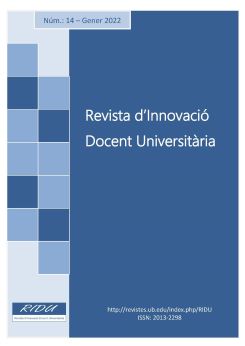Soft skills learning with social challenges
DOI:
https://doi.org/10.1344/RIDU2022.14.5Keywords:
Platform, Challenges, Hybrid Teaching, Leadership, CompetenciesAbstract
An educational innovation project carried out in the first and second courses 20-21 and 21-22 of the Leadership Title of the San Pablo CEU University of Madrid is presented. During this academic year, a new educational project based on mixed virtual teaching (hybrid) has been launched in both courses, where the masterclass or more theoretical sessions have been complemented with a challenge based learning linked to the subjects of both courses, applying the Design Sprint methodology, for which the Teams platform has been used. The objective was to make the student participate in their training process, by seeking an experiential learning of soft skills, typical of any leadership course, applying agile work methods, which are increasingly used in companies. In this sense, challenge-based learning has been an experience where participants have developed solutions that require an interdisciplinary and creative approach for the development of these soft skills.
References
Anijovich, R., De Camilloni, R.M.A., Cappelletti, G., Hoffmann, J., Katzkowics, R., Mottier, L. (2010) La retroalimentación en la evaluación. La evaluación significativa. Paidós, Buenos Aires.
Apple Inc. (2010) Apple Classrooms of Tomorrow-Today. Disponible en: https://www.apple.com/ca/education/docs/Apple-ACOT2Whitepaper.pdf
Boud, D., Feletti, G. (1998) The Challenge of Problem-based Learning. Kogan Page, London.
Clarke, M. (2017) Repensar la empleabilidad de los graduados: el papel del capital, los atributos individuales y el contexto. Estudios en Educación Superior, 43 (11), pp. 1923-1937.
Campo, E., Ceballos, F. (2011) La calidad de la formación virtual en la enseñanza superior. En: Hilera J.R., Cervantes, F., Bengochea, L. Actas del I Congreso Iberoamericano sobre Calidad de la Formación (CAFVIR 2010) (pp. 151-158). Escuela Técnica Superior de Ingeniería Informática, Universidad de Alcalá, Alcalá de Henares.
Cordray, D.S., Harris, T.R., Klein, S.A. (2009) Research Synthesis of the Effectiveness, Replicability, and Generality of the VaNTH Challenge based Instructional Modules in Bioengineering. Journal of Engineering Education, 98(4), pp. 335-348.
Deepika, Chitranshi, J. (2020) Leader readiness of Gen Z in VUCA business environment. Foresight, 23(2), pp. 154-171.
Escudero Escorza, T. (2003) Desde los tests hasta la investigación evaluativa actual: Un siglo, el XX, de intenso desarrollo de la evaluación en educación. RELIEVE, 9(1), pp. 11-43.
Fidalgo-Blanco, Á., Sein-Echaluce, M.L., García Peñalvo, F.J. (2017) Aprendizaje Basado en Retos en una asignatura académica universitaria. Revista Iberoamericana de Informática Educativa, (25), pp. 1-8.
Gaskins, W.B., Johnson, J., Maltbie, C., Kukreti, A. (2015) Changing the Learning Environment in the College of Engineering and Applied Science Using Challenge Based Learning. International Journal of Engineering Pedagogy, 5(1), pp. 34-41.
Instituto Tecnológico y de Estudios Superiores de Monterrey (2016) Aprendizaje Basado en Retos. Disponible en: http://eduteka.icesi.edu.co/pdfdir/edutrends-aprendizaje-basado-en-retos.pdf
Instituto Tecnológico y de Estudios Superiores de Monterrey (2016) Radar de Innovación Educativa 2017. Disponible en: http://eduteka.icesi.edu.co/pdfdir/edutrends-radar-innovacion-educativa2017.pdf
Johnson, L., Adams Becker, S., Estrada, V., Freeman, A. (2015) NMC Horizon Report: Edición Educación Superior 2015. The New Media Consortium, Austin, Texas.
Knapp, J. (2018) Sprint. El método para resolver problemas y testar nuevas ideas en solo cinco días. Editorial Conecta, Barcelona.
Kroll, C. (2015) Sustanaible Development Goals: Are the rich countries ready? Sustanaible Governance Indicators - BertelsmanStiftung, Alemania.
Kucukozyigit, A.C. (2020) A Quest to Identify the Emerging Leadership Skills in VUCA World and Investigation of Their Applications in Various Organizational Levels and Security Environments. Doctor of Philosophy (PhD), Dissertation, Engineering Management & Systems Engineering, Old Dominion University. Disponible en: https://digitalcommons.odu.edu/emse_etds/180
Larmer, J. (2015) Project-Based Learning vs. Problem-Based Learning vs. X-BL. Disponible en: https://www.edutopia.org/blog/pbl-vs-pbl-vs-xbl-john-larmer
Martínez-Melis, N., Hurtado, A. (2001) Assessment in Translation Studies: Research Needs. Meta, 46 (2), pp. 272-287.
Moore, T., Morton, J. (2017) ¿El mito de la preparación para el trabajo? La comunicación escrita, la empleabilidad y la 'brecha de habilidades' en la educación superior. Estudios de Educación Superior, 42 (3), pp.1-19.
Naciones Unidas (2018) La Agenda 2030 y los Objetivos de Desarrollo Sostenible: una oportunidad para América Latina y el Caribe (LC/G.2681-P/Rev.3). Naciones Unidas, Santiago.
Disponible en: https://repositorio.cepal.org/bitstream/handle/11362/40155/24/S1801141_es.pdf
Pérez-Tornero, J.M. (2008) Teacher Training Curricula for Media and information Literacy. International Expert Group Meeting. UNESCO Headquarters, Paris.
Przybysz-Zaremba, M., Rimkūnienė, D., Vasilienė-Vasiliauskienė, V., Butvilas, T. (2017) Project-based learning: the complexity, benefits and challenges within 21st Century Education. Journal of Educational Review, 10(1-2), pp. 95-99.
Redecker, C., Leis, M., Leendertse, M., Punie, Y., Gijsbers, G., Kirschner, P., Stoyanov, S., Hoogveld, B. (2011) The Future of Learning: Preparing for Change. Disponible en: http://ipts.jrc.ec.europa.eu/publications/pub.cfm?id=4719
Succi, C., Wieandt, M. (2019) Walk the talk: soft skills’ assessment of graduates. European Journal of Management and Business Economics, 28(2), pp. 114-125.
Tünnermann Bernheim, C. (2010) Las conferencias regionales y mundiales sobre educación superior de la UNESCO y su impacto en la educación superior de América Latina. Universidades, 47, pp. 31-46.
Downloads
Published
Issue
Section
License
Copyright (c) 2022 Sonia Martín Gómez, Angel Bartolome Mu´ñoz de Luna

This work is licensed under a Creative Commons Attribution 4.0 International License.
Authors whishing to publish in this journal agree to the following conditions:
- The author or author retain copyright and grants the journal the right of first publication of the paper.
- The texts will be published under license "Reconocimiento Creative Commons 4.0 España", which allows to share, distribute, reproduce and the public communication of the paper, as long as the name of the author or authors and the journal are clearly stated.







